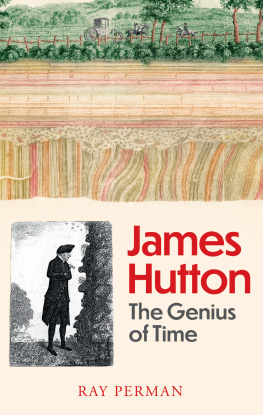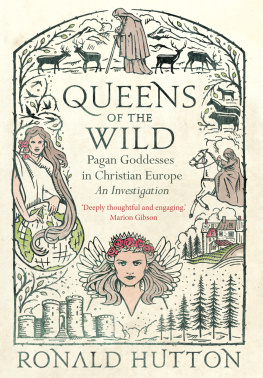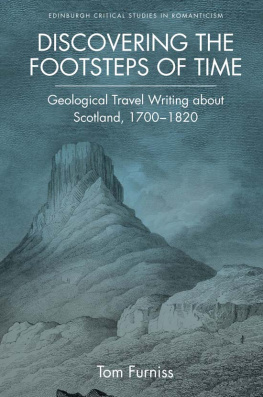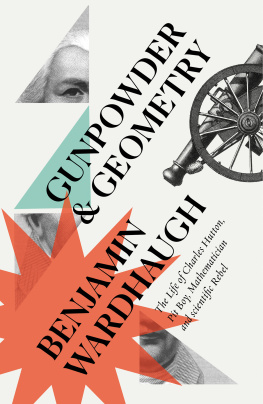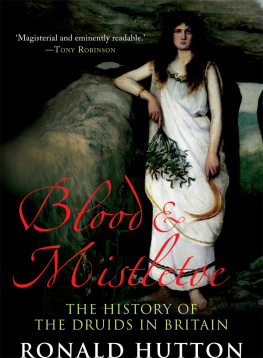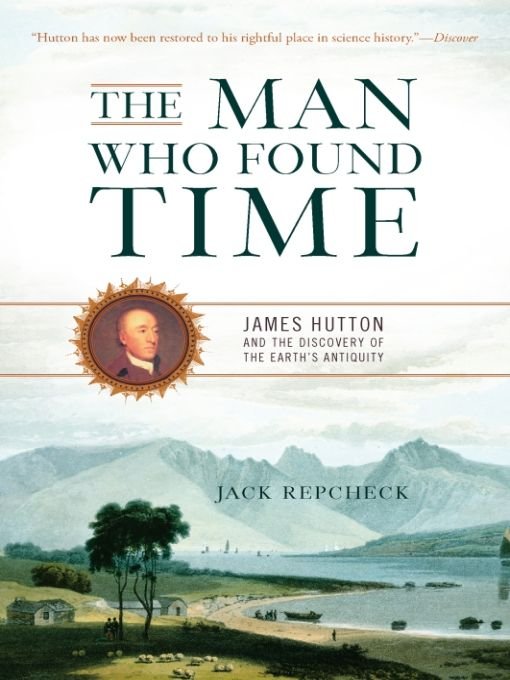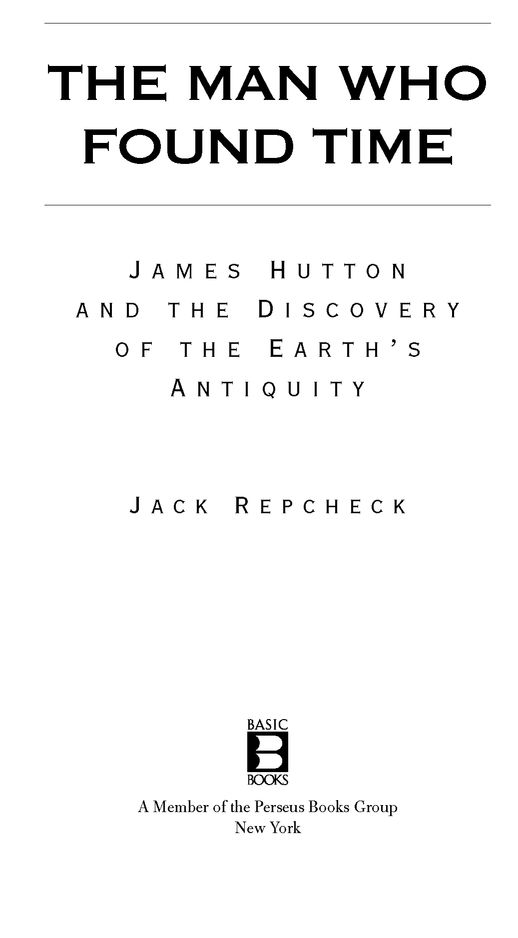Table of Contents
PRAISE FOR
The Man Who Found Time
This is an informative and revealing book.
Times Higher Education Supplement
An interesting story, gracefully written and concisely told, that will appeal to readers intrigued by the history of scientific thought.
Baltimore Sun
Worth reading... Repchecks description of the Scottish Enlightenment is fascinating.Boston Globe
Provides many fascinating facts and much praiseworthy prose... well worth the read.Washington Times
A slim volume thats as readable as it is informative.... [Repchecks] argument... is convincing.
Providence Journal
Engaging and suspenseful, Repchecks excellent biography is highly recommended... the most recent and most detailed account of Huttons life and science.
Library Journal Starred Review
Repchecks comfortable style and enthusiasm for his subject permeates his book.Publishers Weekly
Fluidly informative, Repcheck will easily snare readers...
Booklist
PROLOGUE
He burst the boundaries of time, thereby establishing geologys most distinctive and transforming contribution to human thoughtDeep Time.
Stephen Jay Gould, 1977
BEFORE THERE WAS SCIENCE, there was the Bible. For thousands of years, it supplied reassuring answers to those profound questions that humans have always asked. Who are we? Where are we in relation to everything else in the universe? And how and when did we get here, this place we call Earth?
The Bibles teachings about the mysteries of existence were comforting. The Book of Genesis said that an all-knowing, all-powerful God created the heaven and the earth on the First Day. Over the next five days, all creatures that walk, crawl, and swim were given life. And God was pleased. Even more soothing were its teachings about us. Man, we were told, was formed in nothing less than Gods own image, the earth a special home for His highest creation. Adam and Eve and their descendants had certainly fouled things up, to the point where God eventually felt compelled to start over with Noahs family. But, still, man was uniquely blessed, and Earth was his dominion.
One of the few mysteries not resolved explicitly in the Bible was the age of the universe. But learned scribes, teasing information from the Holy Scriptures, and paying close attention to the Hebrew prophesies, had stepped in to supply the answer. They calculated that Creation had occurred not quite 6,000 years ago.
Yet the reverence accorded to biblical answers caused problems, the most serious being that it prevented rigorous and systematic examination of the very world that God had created. Scholars who investigated fields that did not touch on church doctrine were relatively unaffected, but those who explored the natural world were playing with firethe figurative fire of controversy, the real fire of the heretics pyre, and the eternal fire of damnation if the church felt they had stepped too far. It required genuine bravery even to venture into these issues; it required hard-to-imagine resolve to promote a position that conflicted with church teachings.
A surprising number of individuals had this unique form of intellectual courage, but it was largely the work of just four men who shattered the biblically rooted picture of Earth and separated science from theology.
The first was Nicolaus Copernicus. A Catholic cleric living in what was then Prussia, Copernicus argued in 1543 that the sun, not the earth, was the center of the universe. All those wondrous heavenly bodies revolved not around mans home, but a ball of fire in the sky. If the earth was no longer the center of things, was it still special? Why would God choose a place other than the center of the universe as the home for a creation made in His own image? Because Copernicus expected his theory to bring on the wrath of church leaders, he waited until the end of his life to publish it. The cleric was on his deathbed when the first copies of his book, De Revolutionibus Orbium Coelestium (1543), arrived from the printer.
Because of a cryptic introduction and the technical nature of the work, Copernicuss book did not have a profound impact immediately. It took Galileo, the first celebrity scientist, to publicize the true meaning of what Copernicus had written. Ninety years after Copernicuss death, Galileo was placed under house arrest by the Inquisition for endorsing the Copernican system in his influential book, Dialogue Concerning the Two Chief World Systems (1632).
As troubling to the devout as Galileos endorsement of Copernicuss sun-centered universe was, it was not as bad as what would come next. After all, the Bible did not actually state that the earth was the center of the universe. That doctrine came from St. Thomas Aquinas, the influential Catholic scholar who lived and wrote during the thirteenth century. He took the idea from the Greek astronomer Ptolemy. However, the Book of Genesis did say that the earth was formed on the First Day of Creation and that Adam was created five days later, a sequence that everyone knew had occurred almost 6,000 years ago. The King James Bible, first published in the seventeenth century, verified this common knowledge by placing specific dates for key events right in the margin. Thus, all English-speaking Christians knew that God had created the earth on October 23, 4004 B.C.
James Hutton, a Scottish natural philosopher, boldly confronted this centuries-old wisdom. Writing in 1788, he formally presented proof that the earth was significantly older than 6,000 years. In fact, its age was incalculableit could be hundreds of millions of years old, it could be billions. Hutton reached his conclusion about the age of the planet through his revolutionary theory of the earth, which recognized the importance of the glacially slow process of erosion coupled with the dynamic movements of earths surface caused by intense underground heat.
Most previous scholars who had developed hypotheses about the earth had never questioned the churchs teachings. They saw Noahs Flood or the waters of the unformed earth as the explanation for all odd geologic formations, thus allowing the age of the earth to fit within six millennia. After the intellectual revolution started by Sir Isaac Newton in the late 1600s, a group of biblical geologists tried to develop sophisticated theories that used modern science to shoehorn the earths history into 6,000 years. And though a handful of predecessors had questioned whether the history of the physical earth could fit into such a short time frameone had even calculated the age of the earth to be 75,000 yearsthe strictures of the past were hard to overcome. Hutton completely ignored the Bible and the Deluge, and as a result he was able to clearly see what rock formations told him.
Huttons theory was deeply upsetting on two counts. First, it questioned the veracity of the Bible, and second, it displaced humans from close to the start of time. If the Book of Genesis was correct, man was created only five days after the earth was; if Hutton was correct, the earth had existed for eons before man came along. So, Copernicus took man away from the divine center of things, and Hutton took him away from the divine beginning of things.



